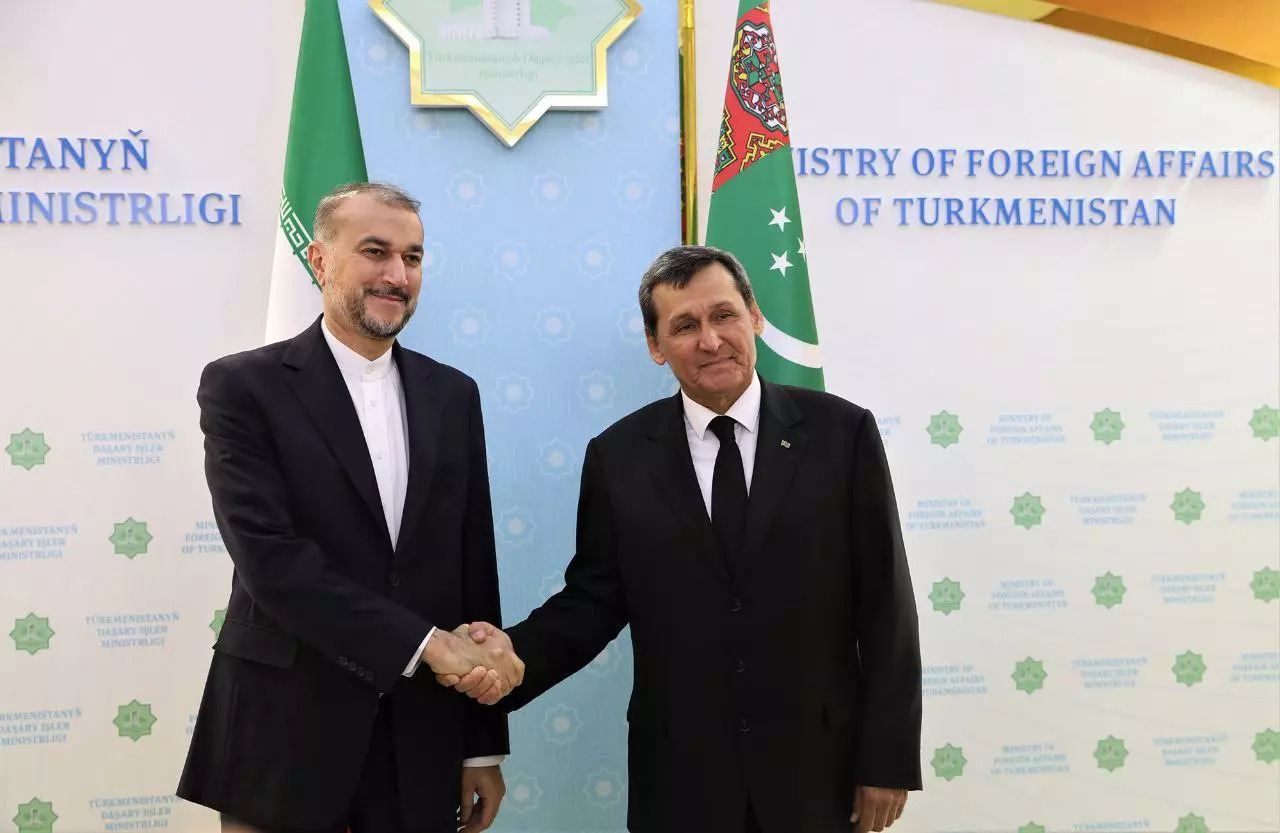Turkmen President Serdar Berdimuhamedow said that Iran is "one of the most important partners" of his country in the energy and transport sectors.
"Developing multifaceted cooperation with countries of the world, primarily with closest neighbours, based on friendship, mutual respect and trust is one of the key areas of Turkmenistan’s foreign policy," Berdimuhamedow said at a meeting with Iran's visiting Foreign Minister Hossein Amir-Abdollahian, the state news agency Turkmenistan Today reported on March 29.
He noted that Iran was traditionally one of the most important partners with which Turkmenistan maintains trade and economic relations.
Berdimuhamedov also praised the joint Turkmen-Iranian group on economic cooperation for taking "specific measures to develop cooperation in the electricity and transport sectors".
"Successful implementation of projects in these areas will give impetus to the development of bilateral partnerships," he added.
Meanwhile, Amir-Abdollahian evaluated the growing trend of bilateral relations as positive and emphasized the measures undertaken by the relevant Iranian authorities for the implementation of the agreements made between the two countries, including in the economic fields.
The Iranian minister pointed to the meeting of the Joint Economic Commission, the Consular and Border Cooperation Commission, and the agreements reached to develop economic cooperation between the two countries in the fields of gas, electricity, water management, transportation, and transit, implementing infrastructure projects, and increasing trade exchanges.
The two also were keen to find on new methods of cooperation in the fuel and energy complex in line with modern requirements, and stepping up relations in the export and transit of energy resources.
Turkmenistan has been supplying gas to Iran as part of a swap arrangement with Azerbaijan. Iran relies on the Turkmen gas to fuel its remote north-eastern areas. However, the supply was reportedly suspended in January due to a lack of agreement on the contract.
In a meeting with the Iranian foreign minister on March 28, former Turkmen president, Gurbanguly Berdimuhamedow, who still holds significant power as the speaker of the People's Council, noted that Iran "occupies an important place in Turkmenistan's foreign trade".
He confirmed Turkmenistan’s commitment to expanding mutually beneficial trade and economic partnership with Iran.
The sides also expressed their intention to strengthen effective cooperation in sectors such as the fuel and energy complex, transport and communications, construction, and agriculture.
Amir-Abdollahian also met his Turkmen counterpart Rashit Meredow during his one-day visit to Ashgabat, and discussed several issues such as boosting economic and energy cooperation and following up on their share from a joint border dam.
Built on the Harirud River, the water reservoir is an international water basin shared between Iran, Turkmenistan, and Afghanistan. Countries adjacent to the Harirud basin suffer from water shortages and expanding needs in the agricultural and industrial sectors.
Referring to recent economic agreements between the two countries, the Iranian diplomat called for expanding cooperation between Tehran and Ashgabat in the fields of gas, electricity, water management, transport and other regional and international topics.
Amir-Abdollahian called for "constructive cooperation" among the Caspian Sea littoral states over legal, security and economic issues, and said that Iran was ready to host the third economic forum of the Caspian Sea littoral states at the prime ministerial level.
The Iranian minister also added that attempts by third parties to have a military presence in the Caspian Sea were against the interests of the region.
Fighting terrorist groups in the region, threats of extremist groups and the necessity to cooperate over border waters, were among the topics discussed at the meeting of the top diplomats.
Turkmenistan and Iran are among the world’s most energy-rich nations, possessing substantial oil and natural gas reserves. Iran ranks second, while Turkmenistan is fourth globally in terms of proven gas reserves.
The Turkmen officials reiterate that Ashgabat will not give up a project to build the Trans-Caspian underwater gas pipeline bypassing Russia to supply its gas to Europe. The pipeline could be connected to the Southern Gas Corridor that links Azerbaijan with the EU countries through Georgia and Türkiye.
The project is criticized by Iran and Russia, previously significant transit countries for Turkmen gas and current competitors.







 Kyrgyzstan has joined the extensive reconstruction efforts in the Karabakh region of Azerbaijan, after a series of mega initiatives were launched b...
Kyrgyzstan has joined the extensive reconstruction efforts in the Karabakh region of Azerbaijan, after a series of mega initiatives were launched b...
 President Ilham Aliyev shed light on the evolving contours of the peace process with Armenia during an international conference in Baku this week. ...
President Ilham Aliyev shed light on the evolving contours of the peace process with Armenia during an international conference in Baku this week. ...
 Azerbaijan and Armenia started the process of demarcation of their border on Tuesday, with the installation of the first border markers based on ge...
Azerbaijan and Armenia started the process of demarcation of their border on Tuesday, with the installation of the first border markers based on ge...
 As the conflict between Ukraine and Russia escalates, the strategic importance of Kharkiv, Ukraine's second-largest city, has come sharply into focus.
As the conflict between Ukraine and Russia escalates, the strategic importance of Kharkiv, Ukraine's second-largest city, has come sharply into focus.



